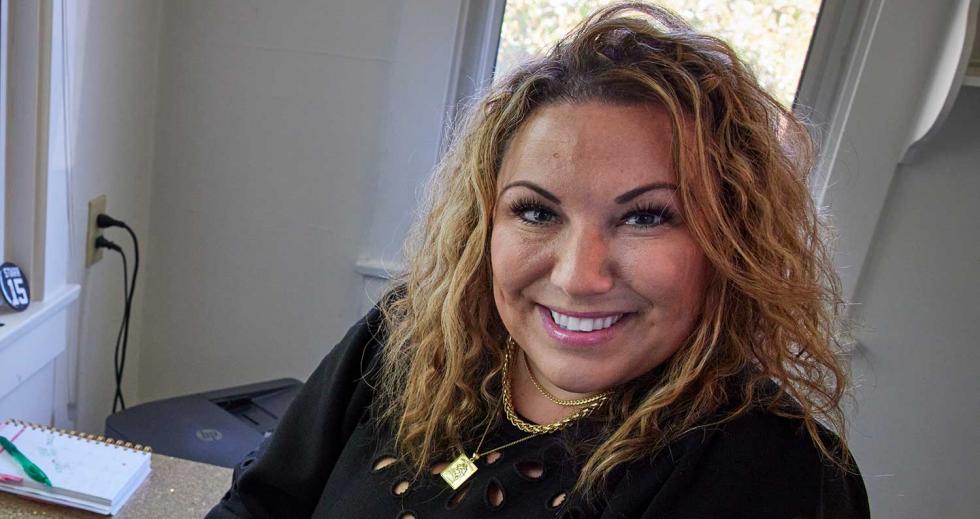Since March 2020, it’s been a bad time to operate a hair salon. Alfonso and Lorena Martinez, owners of The Colour Bar, which has locations in Midtown and East Sacramento, endured three shutdowns totaling six months between March 2020 and March 2021. Early on, they had to lay off 19 of 22 staff.
But they focused on essentials: They kept their two marketing experts to stay in touch with clients and a bookkeeper to keep their finances in order. Customers bought gift certificates to show their support, and the company reminded them they could buy hair-care products through The Colour Bar’s website. At first, those online sales were mostly local. But as their virtual sales ticked up, they added a graphic designer and more marketing staff to boost traffic. The result is an attractive, high-end website that features frequent flash sales. Soon the company was selling statewide and then nationally. Now the web sales side of the business is as important as in-person salon services. The company is back up to 16 staff, says Alfonso Martinez.
It wasn’t a great time to be a startup, either. Mathew Magno is CEO at Davis-based Japa, which started in February 2017 and developed a smart parking app and related tools to identify open parking spots. Going into 2020, the target customers were universities — until those shut down after COVID-19 hit. “We had to say, are we just going to wait until things open up to get back to work, or do we pivot ourselves?” Magno says. The company started marketing to hospitals and municipalities, landed new clients and last year turned its first profit.
As many businesses scrambled to keep themselves afloat last year, their owners had to puzzle through an equally tough question: how to manage their money at a time when the future looked mostly dire. Now, with the economy improving as more people get vaccinated, Capital Region business owners say they’ve learned more about how to keep their personal and business finances on track during an economic crisis. Here’s what they and local financial planning experts say helped businesses survive the past year.
Emergency Reserves
For owners trying to stay solvent during the pandemic, there were several terrible moments, but maybe none worse than mid-to-late summer in 2020, when government loans and rescue packages were rolling out. Businesses knew money was on the way, but the government had to depend on banks to get it that last mile. Managing these programs wasn’t terribly profitable for banks, and some small businesses were too small to get banks’ attention, so they got ignored, says Grant Bledsoe, a certified financial planner at Three Oaks Wealth in Sacramento: “It was a brutal six- or eight-week period. There were a couple of months of total desperation for many businesses.”
It was another lesson in the importance of cash reserves for business owners. Bledsoe recommends reserving between six months and two years of personal living expenses and, depending on the business type, up to two years of business operating expenses too. Two years’ worth of cash is a lot, but a substantial recession can stretch that long, he says. Almost none of his firm’s business clients had to close because, by and large, they took that advice, he says.
For Rachel Smith, owner of Sacramento public relations consulting firm WordSmith Communications, keeping 3-6 months of cash on hand was the central focus of her financial management. “A contract can be canceled very easily, which is completely understandable in this market,” she says. Her cash cushion let her retool to add virtual event planning as a line of business. She did a few pro bono events for clients and then found a thriving demand for the service.
WordSmith Communications owner Rachel Smith keeps up to six
months of cash on hand as her financial safety net.

Davis-based company Engage3, which helps food retailers use data to develop pricing strategies, devised another solution to a cash crunch when last spring’s economic collapse made investors pull back on financing and upended the company’s budget. Company leaders had to decide whether to cut back, which would include laying off staff. Instead, they set up a voluntary savings program that in effect let employees lend the company money at an agreed interest rate. It drew enthusiastic participation, helped the company get through, and let them avoid layoffs, says CEO Edris Bemanian.
This downturn also was a lesson in the value of keeping business and personal cash reserves separate, says Charles Ho, a certified financial planner and the founder of Legacy Builders Financial in Folsom. When the crisis hit, owners who kept a separate cash reserve for the business were less likely to have to choose between saving the business and jeopardizing their personal finances, he says.
Market Madness
A lot of people still think the S&P 500 and Dow Jones Industrial Average were a disaster last year, says Kevin Thelen, certified financial analyst at Prospero Wealth Advisors in Roseville. Yes, the Dow dropped almost 40 percent over the span of six weeks in February and March 2020. But by the end of the year, it had regained all the lost value and then some, ending up 6 percent higher for the year. By April 16 of this year, it was up another 12 percent to hit an all-time high. The S&P and Nasdaq’s numbers were even better.
All that goes to show you can’t usually win by trying to time the market, say financial advisers. If in March 2020, you’d told someone that the pandemic would make indoor gatherings impossible, force businesses to reshape themselves to survive and cause a global slowdown, “You’d have said this would end poorly for the market,” says Pat McClain, cofounder and senior partner at Sacramento-based Allworth Financial and co-host of the “Money Matters” talk radio show.
Instead, the opposite happened. Incomes for about half the population, especially those who worked in service businesses instead of brick-and-mortar retail, weren’t much affected. Because they had fewer outlets for spending money, their savings rates increased. With interest rates low, meaning few investment alternatives, they put their money in the stock market, driving it back up. The experience illustrates why a diversified portfolio is important: You can’t predict the equity or bond markets over short periods, McClain says. “Over the long term, stock prices are driven by underlying company earnings,” he says. “Over the short term, they’re driven by sentiment.”
Now, instead of market paranoia, we may have its euphoric opposite — a public that thinks the market can’t lose, says Suzy Taherian, adjunct professor at UC Davis Graduate School of Management and chief financial officer at electric powertrain manufacturer Wrightspeed. An institutional investor recently told her about a young woman working as a maid who took her $15,000 life savings and bet on one company, just before the value fell by half. The level of day trading has almost doubled since the beginning of 2020, according to a Credit Suisse report earlier this year.
But for amateur investors, betting on individual stocks is still usually a long-term loser, says Taherian. Those who feel strongly about an individual stock like GameStop or a risky commodity like Bitcoin should invest no more than 10 percent of their portfolio there, she says. They should keep the other 90 percent in a 401(k), a Federal Deposit Insurance Corp.-insured account or a diversified mutual fund.
And given today’s high valuations, Thelen says it’s a good time for investors to be cautious and make sure the risk level of their portfolio is appropriate. Big institutional investors are selling their stock portfolios and buying bonds, so individual investors whose stock portfolios got a big lift last year should rebalance, he says.
“In the new millennium, we’ve had the tech bubble burst, the financial crisis and the coronavirus (crisis),” Thelen says. “And every single time, not freaking out and instead sticking to a nice, disciplined approach, with a diversified strategy of stocks and bonds, has really done well.”
Debt’s a Drag
McClain says businesses that were carrying less debt were more likely to survive last year’s economy. Debt is a lever, but it works in both directions, increasing profits when business goes well but magnifying losses when it doesn’t. So in 2020, retail stores and restaurants that owned their own shop outright and weren’t paying leases or mortgages were more likely to survive even though they were hit hard, McClain says. In a crisis, you can cut hours and other expenses. But leases and debt service are the hardest to change, he says.
Being debt-light worked well for Josh Rubin, CEO of Post Modern Marketing, a Sacramento-based marketing, web design and site maintenance firm. He started the web design and SEO company Creative California in 2009, then merged in 2016 with the company Post Modern Marketing, becoming owner and CEO the following year. Part of his business strategy from the beginning has been not to grow using debt. It helps that he’s in a service business, so 70-80 percent of the company’s costs are labor. He’s sympathetic to businesses with different cost structures that were in debt and shut down, but not having to make debt payments was one reason his company could survive a 40-percent drop in revenue in second quarter 2020. By the end of the year, it had made it up and equaled its 2019 revenue.
Bledsoe of Three Oaks Wealth believes in businesses doing whatever they need to ride out a crisis because making it to the other side means lots of opportunities. If that means not funding your retirement account for several years so you can have enough cash to stay afloat, so be it. “Doing whatever you can do just to stay in the game is really important,” he says.
That’s been true for Bobby Reed, CEO of digital marketing and software development company Capitol Tech Solutions in Sacramento. In April and May 2020, the company’s donation processing business took a huge hit. But it held on, and that part of the business came all the way back. The company has added four staff since then, Reed says. On the personal investing side, surviving means he’s been able to take advantage of opportunities: He just bought a commercial building and is looking at perhaps purchasing a restaurant or gym, given that owners in those sectors now might be looking to get out.
What Comes Next
Now comes the 2021 rebound, if all goes as predicted. “I think we’re right at the beginning of a huge surge in consumer spending in 2021,” says Jeffrey Michael, an economist and the executive director at University of the Pacific’s Center for Business and Policy Research.
The number of payroll jobs in the Sacramento area fell by about 8 percent from February 2020 to September 2020, according to a brief the center published in March 2021. (It defines the area as Sacramento County plus the five adjacent counties to the north.) Despite the job losses, total wage earnings for the area as a whole didn’t fall much because most of the positions lost were lower paid, Michael says. Meanwhile, state and federal dollars poured in through unemployment insurance, the Paycheck Protection Program and more. And with restaurants closed and vacations canceled, consumers had fewer places to spend money.
All that means households on average are sitting on record levels of savings, according to a March 2021 Federal Reserve report. “If you’ve got a small restaurant, you could go from having your worst year to some of the busiest nights you’ve ever seen a few months from now,” Michael says.
The Colour Bar’s Martinez senses that having survived last year the company is positioned for even brighter days. “I think that when everybody is holding back, it’s actually time for us to spend more to grow our business,” he says. “We’re going to be conservative, but we’re also going to be very strategic and willing to risk. I think we’re in a position where the next move is going to be really big.”
–
Stay up to date on business in the Capital Region: Subscribe to the Comstock’s newsletter today.
Recommended For You

Rediscovering the Meaning of ‘Onward’
Comstock’s president and publisher considers California’s forthcoming reopening.

Survival Strategy
Downtown Sacramento restaurants plan for a future, although unknowns remain
More than a few downtown eateries have become casualties of the COVID-19 pandemic. Those that remain are embracing long-term survival strategies.

Three Steps to Kick-Start Startup Investment
These three steps can help your company reach the right investors.

Five Tips to Help Make the Most Out of Your Tax Refund
Seeing your account balances increase as you save or get a tax refund is exciting, but it’s important to make smart decisions with unexpected money. Here are some ways that you can make the most of extra cash.




